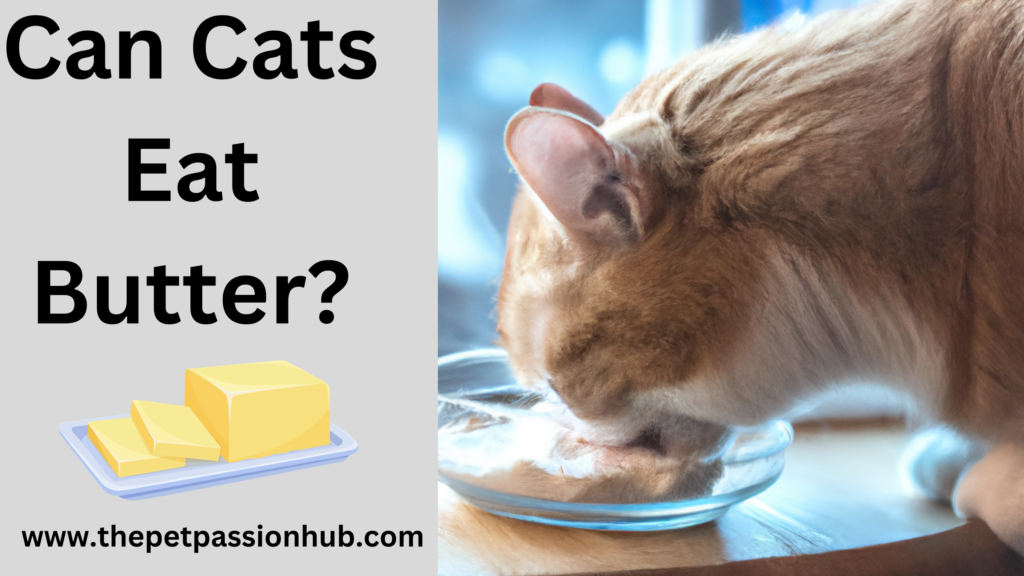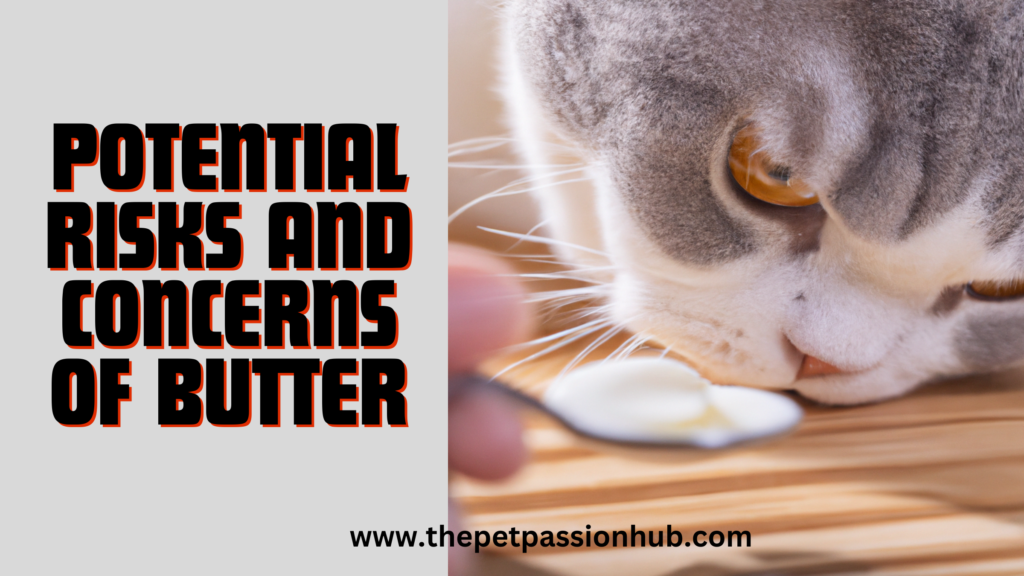Introduction
Cats are known for their curious nature and often find themselves intrigued by the sight and smell of butter. But can cats actually eat this creamy delight?
As a cat owner, it’s important to know whether this common household ingredient poses any risks to your feline friend.
In this article, we will delve into the fascinating world of cats and butter, exploring vet-approved facts. And frequently asked questions to provide you with a comprehensive understanding of whether it’s safe for cats to indulge in this dairy treat.
Can Cats Eat Butter? Exploring the Facts.

When it comes to the nutritional value of butter for cats, it’s important to approach this topic with caution.
While cats are obligate carnivores and derive most of their essential nutrients from meat. A small amount of butter can provide some benefits.
Butter is a good source of fat-soluble vitamins like A, D, E, and K. Which can support your cat’s overall health.
However, it’s crucial to remember that too much butter can lead to obesity and other health issues in cats.
Additionally, while cats may enjoy the taste of butter, it’s important to be mindful of their lactose intolerance.
Many cats have difficulty digesting lactose, a sugar found in milk and dairy products like butter. This can lead to gastrointestinal upset such as diarrhea or vomiting.
Therefore, if you choose to give your cat a small amount of butter as an occasional treat. Make sure they tolerate it well and monitor for any negative reactions.
In conclusion, while butter can provide some nutritional benefits for cats in moderation due to its fat-soluble vitamins content. It’s essential to exercise caution and pay attention to your cat’s individual needs and sensitivities.
Opting for alternative sources of essential nutrients that are more suitable for feline digestion. It will help ensure your cat maintains optimal health without any potential adverse effects associated with butter consumption.
Nutritional Value of Butter for Cats
While cats may enjoy the taste of butter. It’s important for cat owners to be aware of the potential risks and concerns. Associated with feeding their feline friends this indulgent treat.
One major concern is the high fat content in butter. Which can lead to digestive issues such as diarrhea and vomiting in cats.
Additionally, the rich dairy content in butter can cause lactose intolerance symptoms in some cats. Leading to stomach upset and discomfort.
Another risk to consider is the potential for pancreatitis in cats due to the ingestion of high-fat foods like butter.
Pancreatitis is a serious and painful condition that can be triggered by excessive fat consumption. Potentially leading to long-term health issues if not promptly addressed by a veterinarian.
Furthermore, some cats may develop obesity from regularly consuming high-fat foods like butter. Which can have detrimental effects on their overall health and well-being.
It’s important for cat owners to prioritize their pet’s health and seek alternative treats that are safe and beneficial for their furry companions.
Potential Risks and Concerns

Moderation and portion control are essential not only for humans but also for our furry friends. When it comes to feeding cats, maintaining moderation ensures that they receive the right balance of nutrients without overindulging.
Portion control is especially crucial for cats prone to weight gain, as obesity can lead to various health issues including diabetes and joint problems.
By carefully monitoring their food intake, we can help our feline companions maintain a healthy weight and overall well-being.
Furthermore, practicing moderation and portion control with treats is equally important in a cat’s diet. While the occasional indulgence is acceptable, excessive treats can contribute to an unbalanced diet and potential health complications.
As responsible pet owners, it is vital to be mindful of the quantity and frequency of treats offered to our cats.
Being mindful of moderation and portion control not only supports their physical health but also promotes a harmonious relationship between us and our beloved feline friends.
The Truth About How Long Kittens Cry For Their Mom
Moderation and Portion Control
FAQs about cats and butter are common, and it’s important to address them. One question that often arises is whether cats can safely eat butter.
While small amounts of butter may not immediately harm a cat, it can lead to gastrointestinal distress due to its high fat content.
Moreover, some cats may be lactose intolerant, making butter consumption even riskier for their digestive systems.
Another frequent query is why cats seem so attracted to the smell of butter. This can be attributed to the high fat content in butter, which makes it an appealing scent for felines.
However, it’s crucial for cat owners to resist giving in to their pets’ curiosity when it comes to this dairy product, as repeated exposure can have negative health implications for their beloved companions.
Can Cats Eat Butter? Vet-Reviewed Facts and FAQ
Frequently Asked Questions about Cats and Butter
As experienced veterinarians, our experts unanimously agree that while a small amount of butter might not harm your cat, it’s not an ideal part of their diet.
The high fat content in butter can lead to digestive issues and obesity in cats if consumed regularly.
It’s important for pet owners to understand that every cat is unique, and some may be more sensitive to dairy products than others.
While it may be tempting to give your furry friend a taste of butter as a treat, our vets recommend opting for cat-friendly snacks like plain cooked meats or specially formulated treats to ensure their overall health and well-being.
In addition to the potential digestive issues associated with butter consumption, another concern from our veterinary experts is the risk of pancreatitis in cats.
A small lick of butter here and there might seem harmless, but the reality is that the rich nature of butter can trigger inflammation in the pancreas and lead to serious complications for feline companions.
While it’s important to prioritize understanding your cat’s dietary needs, consulting with a veterinarian before introducing any new food items into their diet is crucial for avoiding any potential health risks down the road.
Our veterinarians emphasize the importance of sticking to a balanced diet tailored specifically for feline nutrition rather than incorporating unnecessary and potentially harmful ingredients such as butter.
Expert Opinions from Veterinarians
In conclusion, when it comes to making informed decisions for your cat’s diet, it’s essential to consult with a veterinarian to ensure that you’re providing them with the right nutrients.
While cats may enjoy the taste of butter, it should only be given sparingly and under supervision due to its high fat content.
Opting for healthier alternatives such as omega-3 fatty acids or fish oil can provide similar benefits without the potential risks associated with butter consumption.
Additionally, considering your cat’s individual health needs and any pre-existing conditions is crucial in determining whether certain foods like butter are suitable for them.
Always prioritize your cat’s well-being by researching and seeking professional advice before introducing any unfamiliar food into their diet.
By staying well-informed and mindful of their nutritional requirements, you can help ensure a long and healthy life for your feline friend.
Conclusion: Making Informed Decisions for Your Cat
In conclusion, it’s crucial for cat owners to make informed decisions when it comes to their feline friends’ diets.
While butter may seem harmless, it’s important to consider the potential risks and impacts on your cat’s health.
As much as cats may enjoy the taste of butter, its high fat content can lead to digestive issues and obesity in cats.
When assessing whether or not to include butter in your cat’s diet, consult with a veterinarian who can provide personalized advice based on your cat’s specific nutritional needs.
With a better understanding of cat nutrition facts and the potential hazards of certain human foods like butter, you can make more educated decisions that prioritize your cat’s well-being.
Ultimately, by staying informed and seeking professional guidance, you can ensure that your cat receives a balanced and healthy diet that supports their overall health and longevity.
Making choices about what your furry companion eats should not be taken lightly – by being proactive. And equipped with accurate information about which human foods are safe for cats, you can create a nourishing diet plan that helps keep them healthy at every stage of life.
FAQs
FAQs about Cats Eating Butter:
- Can cats eat butter?
A- Yes, but in moderation. - Is butter safe for cats to consume?
A- Small amounts are generally okay, but too much can cause digestive issues. - What are the potential risks of feeding butter to cats?
A- Excessive consumption can lead to diarrhea and obesity. - Are there any benefits of giving butter to cats?
A- Butter contains some nutrients that may benefit a cat’s coat and skin. - How much butter is safe for cats to eat?
A- A small lick or a tiny amount as an occasional treat should be fine. - Can kittens eat butter?
A- It’s best to avoid giving kittens any dairy products, including butter. - Are there any alternatives to butter for treating my cat?
A- Consider using cat-safe treats or specially formulated pet products instead. - Should I consult my vet before giving my cat butter?
A- Always consult with your veterinarian before introducing new foods into your cat’s diet.
